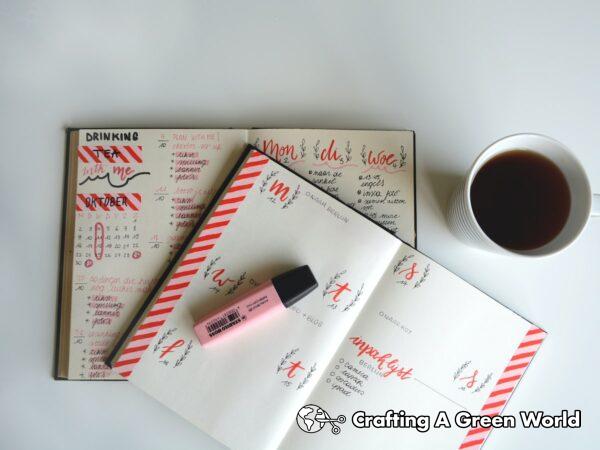Entering the world of Cognitive Behavioral Therapy (CBT) journals can facilitate profound self-growth and a therapeutic avenue for introspection. Using a structured approach, it helps you identify, question and counteract your unhelpful thoughts and behaviors.
In this article, we’ll be sharing a wide variety of CBT journal prompts designed to stimulate your writing endeavors. We aim to equip you with tools to start breaking down your thoughts, feelings, and behaviors, and create meaningful change in your life. Whether you’re a seasoned journal-er or a complete beginner, our set of curated prompts is ready to guide you.
So, pick up your favorite pen, embrace the comfort of your journal, and join us on this enlightening journey towards self-awareness and mental well-being. 🤗
Understanding Negative Thought Patterns
Gaining insight into your negative thought patterns is a crucial step in cognitive behavioral therapy, offering the opportunity to challenge and eventually change these default thinking processes. Here are 20 CBT journal prompts to assist you in understanding your negative thought patterns:
- Describe a situation where you have had negative thoughts about a decision you made. What were those thoughts?
- Write about a time when a negative thought affected your actions. How did it impact you?
- Record a negative thought you had today. What triggered this thought?
- List five of the most common negative thoughts you experience. Where do you think these thoughts originate?
- Reflect on a negative thought pattern you’ve noticed in your life. When did it start?
- Choose a recurring negative thought and attempt to trace it back to its source.
- Write a letter to yourself challenging one of your negative thoughts.
- Recall a situation where negative thinking influenced your decision-making. How could have it been different with positive thoughts?
- Create a dialog between you and your negative thought. What would you say to confront it?
- Identify how often you replay negative experiences in your mind. Why?
- Think of a person you respect. What would they say to challenge your negative thought?
- Describe a situation in which a negative thought turned out to be unjustified. What lesson did you learn?
- Choose a negative thought and come up with five counter-arguments.
- Record a negative thought about your future. What makes this thought unrealistic?
- Write down a situation where negative self-talk affected your performance. What might have happened using positive self-talk instead?
- Reflect on a time when you allowed a negative thought to control a situation. How did it turn out?
- Identify a negative belief you hold about yourself. What evidence disproves this belief?
- Write an encouraging letter to yourself about breaking the cycle of negative thinking.
- Choose a reoccurring negative thought. How does it affect your physical and mental health?
- Consider a situation where you succeeded in overriding a negative thought. Describe how you accomplished this.
Challenging Irrational Beliefs
Challenging Irrational Beliefs through CBT journal prompts can be a powerful tool to combat negative thinking patterns, and help you shift towards a more positive mentality. Below are 20 prompts to help you challenge your irrational beliefs through journaling:
- Identify an irrational belief that you held today. What evidence do you have that contradicts this belief?
- Write about a time your irrational belief turned out to be false.
- Think of a more rational belief that could replace a negative one you hold. How does it make you feel?
- Record an instance where you successfully challenged an irrational belief. How did it change your outcome?
- List the irrational beliefs that are holding you back the most currently. Can you find a pattern or common theme among them?
- Write a conversation between your rational self and your irrational self.
- Draft a letter to yourself from the perspective of a loved one, contradicting one of your irrational beliefs.
- List two pieces of evidence that contradict your most persistent irrational belief.
- Describe an irrational belief you once had but have since overcome. What changed it?
- Write about an irrational belief you wish to challenge. What rational belief can you replace it with?
- Highlight any benefits that challenging and overturning irrational beliefs could have on your day-to-day life.
- Note an irrational belief related to a future event. How can you dismantle this belief?
- Write a positive affirmation that disputes an irrational belief you hold about yourself.
- Identify a character from a movie/book who has irrational beliefs. How would you help them challenge these beliefs?
- Note the thoughts that arise when you challenge your irrational beliefs. How do they make you feel?
- Imagine how your life would look without any irrational beliefs. How would you feel?
- Reflect on how your irrational beliefs impact your relationships. What changes when you challenge these beliefs?
- Record an irrational belief you have about your abilities. Write out an argument that refutes this belief.
- Write a reassurance to yourself about how you’ll handle situations if your irrational fears were to come true.
- Conclude with a commitment to yourself about challenging irrational beliefs daily. How will you hold yourself accountable to this commitment?
Rewriting Unhelpful Thoughts
Rewriting Unhelpful Thoughts through journaling is a method in Cognitive Behavioral Therapy (CBT) that allows us to challenge and modify negative or irrational thoughts, redirecting them towards a more realistic and positive outlook. Here are 20 prompts to guide you in the process of reshaping your thinking patterns:
- Identify a recurring unhelpful thought you often have and write down a more positive or rational alternative.
- Write about an event or situation from two perspectives – one filled with negative thoughts and the other focusing on positive aspects.
- Reflect on a past situation where your negative thoughts altered the outcome. Rewrite that story with positive thoughts.
- Outline a situation that often causes anxiety and pen a narrative around it with a positive outcome.
- Describe a fear you have and then write down three reasons why that fear is irrational.
- Think of a self-defeating belief you hold. Write down evidence that counters that belief.
- Identify an unhelpful thinking pattern you fall into often, and write about how your life would be different without it.
- Write a letter to your future self filled with encouragement and positivity.
- List three negative thoughts you often have about yourself and write a positive affirmation for each.
- Think of a criticism you often receive. Write down three reasons why it’s not true.
- Pen down a situation that triggers anger and depict it in a way that doesn’t.
- Focus on an aspect of your physical appearance you usually have negative thoughts about. Write down what you actually like about it.
- Write about an achievement of yours, which you often play down due to negative thoughts.
- Choose a stressful situation from your life. Write about the same situation with a positive spin.
- Convert a failure into a learning experience by identifying what you gained from it.
- Acknowledge a negative thought you had today and write about how you can put a positive light on it.
- Write down a situation when your negative thoughts were proven wrong.
- Take a negative comment someone made about you and rewrite it into compliment.
- Rewrite a situation where you felt helpless and find instances where you demonstrated control or resilience.
- Choose a fear about the future you often entertain and write down a scenario where that fear doesn’t exist.
Mindfulness And Grounding Techniques
Utilizing Mindfulness and Grounding Techniques during journaling enables us to focus on the present moment, acknowledging our thoughts and feelings without judgement, thereby fostering emotional well-being. Here are 20 writing prompts related to mindfulness and grounding techniques:
- Record the details of a moment today when you felt entirely present.
- Jot down five things you can see, four things you can touch, three things you can hear, two things you can smell, and one thing you can taste right now.
- Write about an emotion you’re feeling currently, without judgement.
- Describe a challenge you’re facing and how it feels in your body without trying to fix or change it.
- Record your thoughts as if they’re clouds passing in the sky, coming and going without attachment.
- Write a dialogue with your worry or stress, understand it’s perspective through mindfulness.
- Sketch a “mind map” of your current state of mind.
- Reflect on a moment of joy you experienced today. Where did you feel it in your body?
- Write about an interaction today where you were entirely present and listened attentively.
- Describe your current emotional state as if it’s a weather forecast.
- Jot down ten things you’re grateful for right now.
- Reflect on any patterns in your thoughts today. Is there a common theme?
- Write about a time when a distracting thought helped you to become more aware of your surroundings.
- Describe your breath right now. Is it deep, shallow, fast, slow? What does that hint at your current state?
- Jot down a mundane task you did today. Describe it in fine detail to practice mindfulness.
- Write about a negative experience, focusing on the sensations it created rather than the story itself.
- List five pieces of personal strength or inner resources you could rely on during challenging times.
- Describe three ways you’ve shown kindness to yourself today.
- Write down three things you can hear in this moment.
- Reflect on a recent decision you made from a place of mindful awareness. What was the process like?
Triggers And Coping Strategies
Identifying triggers and developing coping strategies are key components of cognitive behavioral therapy, facilitating understanding and management of one’s thought patterns and emotions. Here are 20 journal prompts focused on unpacking triggers and formulating coping mechanisms:
- Write about a specific event or situation that recently triggered stress or anxiety for you. What exactly occurred?
- How did your body physically respond to the above trigger? Note the bodily sensations.
- How did your emotions respond to the above trigger? What were the exact feelings?
- In retrospect, how do you evaluate your response to the trigger? Was it productive or counterproductive?
- List three potential coping strategies you could use when encountering a similar trigger next time.
- Choose one of these strategies and describe in detail how you would implement it step by step.
- What is a past coping strategy you’ve used that was effective?
- Write about a past coping strategy that didn’t work out so well. What could’ve been done differently?
- If you could offer advice to someone else dealing with the same triggers, what would it be?
- Picture yourself successfully managing a triggering situation. How do you feel? What are your degrees of comfort and confidence?
- Visualize a stressful situation and imagine implementing your chosen coping strategy until you feel calm.
- Share a success story where you were able to effectively deal with a stressful trigger.
- Write about a trigger that once deeply affected you but no longer does. What changed and why?
- Create an imaginary dialogue with your trigger. What would it say and what would be your response?
- Note down any observable patterns in your triggers and responses. Can you identify any commonalities?
- Describe your ideal state of mind when faced with a trigger. What emotions, thoughts, and actions does it involve?
- What barriers or challenges do you anticipate in implementing your preferred coping strategies?
- List five self-care activities that could help you cope with stress or anxiety that arise from triggers.
- Write a letter to a future self about how well you’ve managed your triggers and how you intend to keep doing so.
- Reflect on your progress in understanding your triggers and refining your coping strategies. What are your key insights and learnings?
Stress And Anxiety Reduction
Through cbt journaling, individuals can manage their stress and anxiety levels better by challenging negative patterns of thought and developing a better sense of balance and control in their life. Here are 20 journal prompts to aid in stress and anxiety reduction:
- Identify a situation that caused you notable stress this week. Why do you think it impacted you so strongly?
- Write about a recurring worry. Is there evidence to support this fear or is it a product of your worst-case scenario thinking?
- Describe a time when you successfully managed to alleviate your anxiety. What strategies did you employ?
- List three things you could do when you start feeling overwhelmed by stress.
- Reflect on an instance where your anxiety turned out to be unnecessary. What lessons have you learned?
- Write a positive affirmation to repeat in stressful situations.
- Discuss a challenge you currently face. How can you break it down into manageable steps?
- Identify a negative thought you often have. Now reframe it into a positive or neutral thought.
- Discuss a stress-inducing scenario that you anticipate in the future. How can you prepare for it?
- Write about a scenario that triggered your anxiety. Could a different perspective change how you felt about the situation?
- Share a memory from a particularly calm and peaceful day. What elements can you incorporate into your daily routine?
- Write down everything that’s currently causing you stress. Now, categorize them into what’s within and out of your control.
- Review a time when you felt anxious about something and it worked out fine. What did that teach you?
- Create a ‘worry schedule’. Choose a limited amount of time to allow your worries. What can you think about outside of this time?
- Draft an action plan for a stressful situation you may face in the upcoming week.
- Identify a thought that regularly causes you anxiety. How could Cognitive Behavioral Therapy (CBT) help manage this?
- List five physical activities that could help to relieve your stress.
- Write about a time you faced a stress-filled situation head-on. How did that make you feel?
- Creating a calming mantra for when anxious thoughts become overwhelming.
- Identify three ways you can prioritize self-care to help manage your stress levels.
Overcoming Fears And Phobias
Overcoming fears and phobias through CBT journal prompts allows you to confront and understand your fears through careful reflection and positive self-dialogue. Here are 20 journal prompts that can guide you on your journey to overcome your fears and phobias:
- Write about a fear or phobia you want to overcome. Be specific about what aspects intimidate you.
- Describe a memory or experience that may have led to your fear. What happened?
- Identify physical sensations in your body when you think about or encounter your fear.
- Visualize yourself successfully facing your fear. What steps did you take?
- Analyze what the worst-case scenario would be if your fear came true. How would you handle it?
- List three positive things you can tell yourself when you face your fear.
- Write a dialogue between you and your fear. What would it say and how would you respond?
- Reflect on any positive aspects or lessons learnt from your fear.
- Think about a person you admire who has overcome fears. What can you learn from their experience?
- Write about the person you would be if you didn’t have this fear.
- List five small, manageable steps that will help you face your fear.
- Write a letter of encouragement to yourself for the next time you confront your fear.
- Describe what your life would look like without this fear.
- What coping mechanisms do you currently have in place for addressing this fear? Consider their effectiveness.
- Reflect on past situations where you have successfully overcome fear.
- Describe the support system you have around you when dealing with your fear.
- Recognize the triggers that intensify your fear and plan ways to avoid or manage them.
- Write about your progress in overcoming your fear so far.
- Imagine a milestone reward for yourself when you face your fear.
- Identify personal strengths and resources that can help you overcome this fear.
Manifesting Positive Self-talk
Manifesting positive self-talk through cognitive behavioral therapy (CBT) journal prompts helps us to overhaul negative thought patterns, increase self-esteem, and promote a healthier mindset. Here are 20 journal prompts that can guide you in manifesting positive self-talk:
- Write down three things you like about yourself and why.
- Reflect on a time when you faced a challenge and successfully overcame it.
- Jot down five things you’re grateful for today.
- Write a letter to your past self, offering words of encouragement and reassurance.
- Describe a moment when you felt proud of yourself. How can you recreate similar moments in the future?
- What qualities do you admire in others that you also possess? Discuss.
- List five achievements you’re proud of, big or small.
- Reflect on a time you received a compliment. How did it make you feel?
- What are three ways you could show kindness to yourself today?
- Write down five positive affirmations, and explain why you chose these.
- Document a time when you stood up for yourself or someone else.
- Write a ‘thank you’ letter to your body, appreciating all that it allows you to do.
- Describe how you have grown or changed in the last year positively.
- Imagine your future self-achieving a goal. What does it look, sound, and feel like?
- What is one negative thought you often have about yourself? Rewrite it into a positive, believable statement.
- Describe a moment when you felt really happy. What triggered this happiness?
- List three things you are looking forward to.
- Write about a recent act of kindness you performed. How could you repeat this in the future?
- What was a recent accomplishment you had? How did it make you feel?
- Write a powerful, supportive letter to your future self.
Expressing Emotions Healthily
Expressing Emotions Healthily with CBT journal prompts supports emotional well-being by providing a structured format for identifying, understanding, and processing feelings. Here are 20 writing prompts designed to stimulate healthy emotional expression:
- Detail an event that aroused strong positive emotions within you. How did your body respond?
- Recall a situation that made you feel anger or frustration. How did you handle those emotions?
- Pen a letter to your younger self, conveying the emotions you wish you had understood better at that age.
- Sketch out a mood chart for the past week, what patterns do you observe?
- Describe an emotional response you had recently that took you by surprise. What do you think spurred it?
- Write about a time you felt torn between two emotions. How did you navigate this?
- Jot down three effective ways to cope with overwhelming emotions.
- Reflect on the last time you expressed your emotions authentically. How did it influence your relationships?
- Describe a situation where you had to suppress your emotions. How did it affect you?
- List three things that fill you with joy and explain why.
- Explore a past event where you replaced negative emotions with positive ones.
- Recall an instance where you identified and named an emotion correctly. How did this make you feel?
- Think about a time you felt fabulous. Write a detailed description of that moment.
- Write about an emotion that you often struggle to express openly.
- Describe a time when understanding someone else’s emotions helped you make a better decision.
- Imagine an alternative ending to a situation that upset you – one where your emotions are validated and addressed.
- Detail a moment when expressing your emotions led to a peaceful outcome.
- Recall an occasion when unexpressed emotions triggered stress or physical discomfort.
- Write about an emotional experience that you found hard to accept. Now, reimagine the situation, embracing those very emotions.
- Chronicle a conversation where you successfully used “I” statements to express your emotions.
Exploring Cognitive Distortions
Exploring cognitive distortions through journaling aids in recognizing flawed thinking patterns and challenging them to improve mental health. Here are 20 journal prompts to help you better understand and combat cognitive distortions:
- Write about a time you jumped to a negative conclusion without all the facts.
- Identify a recent situation where you might have ‘catastrophized’ or imagined the worst possible outcome.
- Reflect on a situation where you engaged in ‘black and white’ thinking, perceiving things as either perfect or a complete disaster.
- Describe a moment you personalized an event, believing it was about you, when it wasn’t.
- Write about an instance when you used ‘should’ statements, expressing what you or others ‘ought’ to do.
- Recall a time you overgeneralized from a single negative experience, expecting it to continue indefinitely.
- Think of a time when you magnified or minimized the importance of an event or detail.
- List three instances when you engaged in emotional reasoning, letting your feelings guide your interpretation of reality.
- Write about a time when you felt like a mind reader, assuming you knew what other people were thinking or feeling.
- Identify a situation where you made a ‘fortune teller error,’ predicting negative outcomes for future events.
- Recall and write about a time when you blamed someone else for your feelings or problems.
- Reflect on a moment when you made an unfair comparison between yourself and others.
- Write about an experience where you discounted positives, insisting they “don’t count”.
- Identify an instance when you took things personally even when there was no direct link.
- Reflect on an event where you attached a global label to yourself or others.
- Describe a situation where you became trapped in ‘analysis paralysis’, over-thinking a decision or situation.
- Recall a time when you held yourself to a double standard, requiring more of yourself than others.
- Write about an instance when you dwelled on a single negative detail or event.
- Reflect upon a time you made judgments without sufficient evidence.
- Write about a situation where you felt everything was unchangeable, ignoring the fact that change is a part of life.
Building Emotional Resilience
Embracing the writing process through journaling can help cultivate emotional resilience, paving the way for improved coping mechanisms and better adaptability to change. Here are 20 thoughtful journal prompts that can help nurture this critical life skill:
- What’s one difficult experience that taught you a valuable lesson about resilience?
- Reflect on a time when you overcame adversity. How did you feel afterward?
- Write about a movie or book character who embodies resilience. How do they embody this trait?
- Think of a setback you experienced recently. How might you approach it differently with the power of resilience?
- Consider a personal strength you have. How can it help you build resilience?
- How did you deal with a disappointment recently? What strategies did you use?
- Recall an event where you were resilient despite adversity. What helped you bounce back?
- Write about a role model who depicts resilience. How have they influenced you?
- List three things that help you remain hopeful during tough times.
- Reflect on a situation where you wish you had been more resilient. What would you do differently now?
- Describe a time when you had to adapt to a significant change. What did you learn about resilience?
- What positive affirmations can you use daily to help you navigate adversity?
- Consider a long-term goal. How can resilience help you achieve it?
- Write about a time when resilience helped you turn a negative situation into a positive one.
- List three ways you could increase your resilience, starting today.
- Reflect on a time when your resilience surprised you. How did it make you feel?
- How has resilience shaped your journey so far in life?
- Explore a challenging period in your life. How can resilience help you come to terms with it and grow?
- What does emotional resilience look like to you in day-to-day life?
- Write a letter to your future self about staying resilient through life’s ups and downs.
Breaking Habitual Thinking Patterns
Breaking Habitual Thinking Patterns through CBT journaling can provide a fresh perspective and help to alleviate rigid, negative thought cycles. Here are 20 prompts designed to help you question and shift your habitual thinking patterns:
- Identify a recurring, negative thought you’ve been dealing with. What would a positive counterpoint to that thought be?
- What action triggers this habitual thought? Think of ways to mend this action-reaction pattern.
- How would your perspective change if your habitual thought turned out to be completely untrue?
- Write about a belief you’ve held for some time now. Is there any evidence that contradicts this belief?
- In what ways have your habitual thoughts influenced your behavior recently?
- Write a letter to yourself from the viewpoint of someone who utterly disagrees with your recurring thought. Defend their stance.
- Consider a time when your recurring thought was proven wrong. How did it make you feel?
- Can you think of a habit that encourages your recurring thought? Make a plan to break it.
- Imagine your best friend had the same recurring thought as you. Write down the advice you’d give them.
- What were the initial sources or influences of your habitual thought?
- Do you think your habitual thought serves you in any way? If it does, how can you keep the benefits and minimize harm?
- Reflect on how much control you have over your recurring thought.
- Write a short story where your recurring thought is personified as a character.
- Detail a scenario where applying your habitual thought has backfired.
- Jot down how this thought may be hindering your growth.
- Describe how you wish to react next time this thought occurs.
- Evaluate the most recent incident when your recurring thought appeared. Was there anything different this time?
- Ponder a productive habit that could replace your current thought pattern.
- Write a goodbye letter to this habitual thought as if you are moving on from it.
- Reflect on the kind of mental space you’d have if you could free yourself from this thought. What would you like to fill it with?
Harnessing The Power Of Gratitude
Harnessing the Power of Gratitude through CBT journal prompts leads to an enduring positivity that fosters resilience and fortifies mental well-being. Here are 20 writing prompts designed to help cultivate gratitude in your everyday life:
- Write about a small everyday thing that you are grateful for.
- Recount a recent interaction with someone that made you feel grateful.
- Describe a challenge you faced and what it taught you to be grateful for.
- Name three things in nature you are thankful for.
- Write about a skill or talent you are grateful to possess.
- Reflect on a possession you’re grateful for, how does it enrich your life?
- Think about a place you love visiting. Why you are grateful for this place?
- List three people you are thankful for and why.
- Describe a memorable experience that instilled a sense of gratitude.
- Jot down five things to be grateful for this week.
- Reflect on a moment of personal growth. How has it made you grateful?
- Write a thank-you letter to someone who might not expect it.
- Dance around your room. What feeling or song are you grateful for that evokes this joy?
- Think about a book or movie you’re grateful for. Why?
- Recount an instance where a negative experience cultivated gratitude.
- Describe something about your body you’re grateful for.
- Write about a meal you’re grateful for.
- Jot down three things you’re grateful for in your home environment.
- Reflect on a personal achievement. How does it make you feel grateful?
- Write about a quality in others that you admire and are grateful for.
Tackling Procrastination
Tackling procrastination through cbt journaling provides a powerful tool to confront and overcome the hurdles that prevent you from accomplishing your tasks effectively. Here are 20 prompts to guide you in journaling your way out of procrastination:
- Identify a task you’ve been avoiding. What emotional response does it evoke?
- Imagine how you will feel after completing a task you’ve been procrastinating on.
- List three reasons why you’ve been putting off a particular task.
- Identify and write down the worst-case scenario if you continue to procrastinate on a significant task.
- Break down a big, intimidating task into smaller, manageable parts.
- Write about a time when procrastination had a negative impact on your life.
- Determine what rewards you can give yourself for accomplishing tasks.
- Envision how your life would look without procrastination.
- Describe how your stress levels change when you procrastinate versus when you take action.
- Identify any patterns or habits that lead to procrastination.
- Plan and write a detailed schedule for the next seven days which incorporates deadlines for tasks you’ve been procrastinating on.
- Reflect on what makes you feel overwhelmed and address these in bite-sized solutions.
- Write about a task you accomplished recently that you had been postponing and how it made you feel.
- Write about someone you know who doesn’t procrastinate and the qualities they possess.
- Think of one task you’ve been procrastinating on and list all the steps needed to complete it.
- Write a positive affirmation that motivates you to take action.
- Reflect on how procrastination affects your long-term goals.
- Write about the fear of failure or imperfection that makes you procrastinate.
- Recognize and write about the difference in your energy levels when you procrastinate versus when you act.
- Identify any particular times of the day you’re prone to procrastination.
Addressing Self-criticism
Addressing self-criticism through CBT journaling encourages us to challenge negative beliefs about ourselves and foster a more balanced self-view. The following 20 prompts can help shift your mindset from self-criticism towards self-acceptance:
- Identify a recent inner criticism you made. Was it fair or harsh compared to how you would judge others?
- Imagine a friend made the same mistake you did. What comforting and supportive words would you say to them?
- Write a compassionate response to a harsh self-criticism you’ve made.
- Capture a time you forgave someone else’s mistake, but not your own. Why do you think this is?
- Put down three kind words or statements about yourself.
- Recount a situation you handled well but didn’t acknowledge.
- Identify a thought pattern that frequently leads to self-criticism and challenge it with a balanced viewpoint.
- Write about a failure that led to significant personal growth.
- List the ways you’ve changed positively in the past year.
- Explore why you tend to criticize yourself and where these negative thoughts stem from.
- Write a compassionate letter to yourself, as if you were a close friend.
- Describe a moment when self-criticism held you back from doing something you wanted.
- Record personal strengths your self-criticism often overshadows.
- Discuss an achievement you downplayed due to self-criticism.
- Illustrate a time where self-criticism was constructive and helped you improve.
- Write down a harsh self-critical belief, then provide evidence that challenges this belief.
- Discuss any fears or worries behind your negative self-talk.
- Record a small daily victory that you usually wouldn’t celebrate due to self-criticism.
- Pen down an affirmation to counteract a common self-criticism that you hold.
- Reflect on the progress you’ve made in addressing self-criticism, however small.
Manifesting Personal Growth
Manifesting Personal Growth with cbt journal prompts involves consciously choosing thoughts, feelings, or behaviors that contribute to one’s development. Here are 20 prompts to guide you in fostering personal growth across diverse aspects of your life:
- Identify a personal trait you wish to develop and write down why it is important for you.
- Describe a challenging situation you have gone through. What did you learn from it?
- Write about an achievement that made you proud. How can you build on this success?
- Acknowledge a recurring negative thought in your mind. What is a positive affirmation to counter it?
- Consider a failed attempt at something. What could you have done differently?
- Outlining a goal that seems unattainable currently. What steps could you take to gradually reach it?
- Reflect on a recent criticism you received. How can you use it for personal growth?
- Write about a challenge you want to overcome in the next six months.
- List down three habits you can adopt for personal growth.
- Recall a time when you stepped out of your comfort zone. How did it contribute to your personal growth?
- Identify aspects of your life where you’d like to improve and establish action points towards achieving them.
- Write affirmations to counter self-doubt and encourage self-belief.
- Acknowledge a weakness and design a plan to turn it into a strength.
- Think of someone you admire. What qualities do they possess that you’d like to develop?
- Identify an area where fear is holding you back. How can you confront it?
- Reflect on a positive change you’ve made in your life. What prompted this change?
- Write about a good habit you’ve developed recently. What motivated this change?
- Think of a mistake you’ve made and how it led you to grow.
- Suggest ways you can remain positive when dealing with setbacks.
- Review your personal growth journey so far, and consider the steps for further development.
Setting Emotional Boundaries
Engaging with the concept of Setting Emotional Boundaries through CBT journal prompts encourages self-awareness and positively contributes to mental well-being. Here are 20 prompts to ponder while journaling:
- Describe a time when someone crossed your emotional boundaries. How did it make you feel?
- Detail a situation where you think you crossed someone else’s emotional boundaries. What led you to this action?
- Reflect upon an instance where you successfully set an emotional boundary. How did it impact the relationship?
- List down three emotional boundaries that are important to you in a relationship.
- Write a letter to yourself about why maintaining emotional boundaries is crucial for mental health.
- Recall a time when you failed to establish an emotional boundary. What would you do differently now?
- Illustrate how you succeeded in maintaining emotional boundaries when dealing with a stressful situation.
- Visualize a scenario where you would need to set an emotional boundary. How would you convey it sensitively?
- List three signs that might indicate that your emotional boundaries have been violated.
- Write about an emotional boundary you find difficult to maintain. What challenges do you face in upholding it?
- Think about a person who respects your emotional boundaries. Write down what makes their approach effective.
- Describe an emotional boundary you wish others would respect more.
- Jot down a conversation you could have with a loved one about your need for specific emotional boundaries.
- Reflect on your childhood. Are there any instances that lead you to set certain emotional boundaries now?
- Write about how setting emotional boundaries has contributed to your self-esteem.
- Describe an area of your life where you could improve your emotional boundaries. How might you go about it?
- Identify a role model who is great at setting emotional boundaries. What can you learn from them?
- Consider possible reactions to your boundaries and write about how you can handle them assertively.
- Jot down five affirmations that remind you of the importance of holding your emotional boundaries.
- Envision the person you would be if you honored all your emotional boundaries. How does this make you feel?
Boosting Mood Through Self-care
Boosting mood through self-care practices can be made more effective by using cognitive-behavioral therapy (CBT) journal prompts, reinforcing positive behavior and helping us engage better with our emotions. Here are 20 prompts oriented towards improving mood through self-care:
- Write about one self-care activity that always helps to lift your mood.
- Reflect on an occasion when you chose self-care and how it affected your emotions.
- Note down any barriers that prevent you from practicing self-care regularly.
- List three ways you could implement self-care into your daily routine today.
- Describe how you felt the last time you accepted you needed a break and took some time for self-care.
- Record what changes you notice in your mood after a session of self-care.
- Ponder on why self-care is important to you and the impact on your emotional wellness.
- Draw up a self-care routine for the next week, focusing on activities that boost your mood.
- Chronicle a time when you neglected self-care and how it impacted your mood.
- Write a letter encouraging your future self to stick to a self-care routine.
- Jot down three things you love about yourself; a key aspect of bolstering self-esteem, which plays a pivotal role in self-care.
- Recount a moment you stood up for yourself and how it made you feel.
- Chart out a list of five books, videos, music, or podcasts that improve your mood.
- Record what makes you happiest about your current self-care routine.
- Describe how your mood changed after exercising self-care during a stressful situation.
- Invent a self-care mantra that you believe would encourage routine practice.
- Note down steps on how to make your favorite self-care activity more effective in lifting your mood.
- Reflect on how your self-perception changes after following a consistent self-care routine.
- Detail a scenario where you prioritized self-care over pleasing others and how it affected your mood.
- Write about how being gentle with yourself in moments of failure helps to boost your mood.
Cultivating Patience And Tolerance
Cultivating patience and tolerance through CBT journaling prompts allows us to manage stressful situations more effectively, while fostering a positive and understanding attitude towards others. Here are 20 prompts that can help in developing patience and tolerance:
- Reflect on a time you demonstrated patience. What circumstances led to it?
- Write about a situation where you wish you had been more tolerant. How could you have adjusted your attitude?
- Describe an instance when someone showed immense patience with you. How did that affect you?
- List down three ways in which you could exercise more patience in your day-to-day life.
- Think about a frustrating situation you encountered recently. How could reframing that situation with patience change your perspective on it?
- Visualize a scenario which requires extreme tolerance. Draft a response to that situation.
- Write about an instance when your tolerance was tested. How did you react and how do you wish you had reacted?
- Think about someone who challenges your patience frequently. Write a kind letter to them, expressing your feelings and intentions to be more patient.
- Recall a time you felt intolerant. What steps can you take to improve your tolerance in such situations?
- Identify your triggers for impatience or intolerance. How can you mitigate these triggers moving forward?
- Craft a letter to your future self, outlining your intention to be more patient and tolerant.
- Outline a situation that requires patience and devise a step-by-step plan on actively practicing it.
- Jot down three positive affirmations that can help you foster patience and tolerance.
- Recall an event where you were proud of your tolerance. What behaviors would you like to repeat in the future?
- Revisit a situation in the past week where you could have exhibited more patience. Write a reflectory note on it.
- Design a mantra or phrase that you can repeat to cultivate patience during stressful situations.
- Brainstorm potential scenarios where you are most likely to lose your tolerance. How would you navigate these situations differently?
- Detail an experience where you could not control your impatience. What could you have done differently to exercise patience?
- Envision your life after successfully cultivating more patience and tolerance. What changes do you see?
- Outline a personal patience and tolerance goal and list the steps for achieving it.
Cultivating A Positive Outlook
Cultivating a positive outlook through cognitive behavioral therapy (CBT) journal prompts empowers you to reframe negative thoughts, leading to improved mental health and overall well-being. Here are 20 prompts to guide you as you work towards a brighter, more optimistic perspective:
- List three accomplishments you’re proud of and describe what they mean to you.
- Write about a difficult situation you overcame, focusing on the strengths and determination you demonstrated.
- Reflect on a positive interaction you had today; what made it enjoyable?
- Detail a personal attribute you appreciate about yourself and why it is valuable.
- Reflect on a kindness someone extended to you recently. How can you pay it forward?
- Describe a moment when you turned a negative situation into a positive one.
- Write about an experience that evoked a sense of awe or wonder.
- Imagine your best possible life five years from now. What does it look like?
- Identify five things you appreciate about your current life circumstance.
- Journal about a meaningful relationship in your life and what it contributes to your happiness.
- List three things you’re looking forward to in the future and why.
- Reflect on a personal growth moment and describe what you learned about yourself.
- Recall a moment you made a difference in someone’s life. How did it make you feel?
- Identify an area in your life where you’ve shown significant improvement.
- Write a letter to your future optimistic self, outlining the positive changes you intend to make.
- Detail a moment when you felt deeply connected to the world around you.
- Reflect on three things you did today that made you feel good about yourself.
- Identify a stressor in your life and write about ways you can view it positively.
- Write about something you’re grateful for and why this incites feelings of gratitude.
- Recall an occasion where you turned an insurmountable obstacle into a stepping-stone. What did you learn from the experience?
Dealing With Anger Effectively
Dealing with Anger Effectively through cbt journal prompts assists in confronting anger and implementing strategies to manage and regulate such strong emotions. Below are 20 prompts that guide you in processing anger through journaling:
- Reflect on a recent moment when you felt angry. What caused that feeling?
- Write about a time when you managed your anger effectively. What strategies did you use?
- Describe an instance when someone else’s anger impacted you. How did it make you feel?
- List three strategies that could help you deal with your anger better today.
- Think about someone who often provokes anger in you. Write a letter expressing your feelings, but don’t actually send it.
- How does your body feel when you’re angry? Are there any physical signs you can identify for future reference?
- Write about a time when you expressed your anger in a way that you regret. How would you deal with the situation differently now?
- Think about someone who is really good at managing anger. What traits do they have that you admire?
- List down three situations, people or events that trigger your anger frequently.
- How would you react if you were completely calm in a situation that usually triggers your anger?
- Explore how your life would be different if you could manage your anger effectively.
- Define in your own words what it means to deal with anger effectively.
- Write an advice letter to your younger self about managing anger.
- Think about the worst outcome of your anger. How does it affect your relationships and mental health?
- Recall a situation when you transformed your anger into something productive. How did you do it?
- What would you like to say to your anger if it were a person in front of you?
- Reflect on a time when your anger drove you to make positive changes in your life.
- Write about an instance when someone’s anger was justified. How did that make you view your own anger?
- List three mantras or affirmations that you can use when you feel angry.
- Imagine a world where you never get angry. How would this affect your life both positively and negatively?
Moving Past Perfectionism
Moving past perfectionism with the help of CBT journal prompts can guide us in embracing our unique imperfections and developing a healthier mindset towards success and failure. Here are 20 writing prompts that can help in this journey:
- Document a recent experience where you felt the need to be perfect. What provoked these feelings?
- Write about what you fear might happen if you aren’t perfect in a given situation.
- Recall a time when you were not perfect, but things still turned out okay.
- Identify three things you appreciate about yourself that have nothing to do with being perfect.
- Write a letter to your younger self about the dangers of striving for perfection.
- Jot down five qualities you possess that are more important than perfection.
- Describe a role model or mentor who portrays healthy attitudes towards perfection.
- Write about a time when your pursuit of perfection hindered your progress.
- List three potential benefits of letting go of perfectionism.
- Reflect on how aiming for perfection has affected your relationships with others.
- Record a situation in which someone else’s lack of perfection did not alter your perception of them.
- Write about what your life might look like if you didn’t strive for perfection.
- Pen a note to perfectionism, explaining why you are choosing to part ways.
- Recall and document a time when you learned from a mistake or failure.
- Visualize a situation where you accept an error and move on. Write about what it feels like.
- List three things you can do when you notice perfectionism creeping in.
- Write about a situation where being imperfect can actually be beneficial.
- Describe a time when you successfully managed your perfectionistic tendencies.
- Reflect on how your life has been impacted by the pursuit of perfectionism.
- Write an acceptance mantra that you can say to yourself when you feel perfectionistic tendencies taking over.
Promoting Empathy And Understanding
Promoting Empathy and Understanding through cbt journal prompts allows individuals to step into the shoes of others, fostering a sense of shared human experience and increasing emotional intelligence. Here are 20 prompts to stimulate empathy and understanding:
- Recall a situation where you felt misunderstood. What could have been done or said differently?
- Think of someone who seems vastly different from you. What might you have in common?
- Write a letter to someone you have a contentious relationship with, expressing understanding from their viewpoint.
- Describe an experience from the perspective of someone you admire. How might they view it differently?
- Recognize a time when you felt deep empathy for someone else. How did it affect you?
- Jot down three things you could say to someone going through a difficult time to express empathy.
- Reflect on a moment when someone showed empathy towards you. How did it make you feel?
- Write about a time you found it difficult to empathize with someone. What barriers stood in your way?
- Outline a plan for how you can show more understanding towards those around you.
- Describe a situation from the perspective of a loved one who was distressed. How might they have felt?
- Ponder on a global issue that triggers strong emotions for you. Describe the issue from the perspective of someone who feels the opposite way.
- Remember a moment when you didn’t express understanding. If given a second chance, how would you approach it now?
- Look at your daily routine from the perspective of a friend. What would they think?
- Write about a disagreement you had recently, and explore the other person’s viewpoint.
- Think of a person you find hard to empathize with. List down the possible reasons and how you can try to understand them.
- Outline a conversation between two people with opposing views, and find the common ground.
- Imagine being in another person’s shoes, someone who is going through a struggle you have never faced. Write about their fears and hopes.
- Reflect on a time you felt deep understanding for someone else’s plight. Describe the situation and your reactions.
- Think of a person you know who is very empathetic. Describe a situation where they demonstrated this trait.
- Lastly, ponder a scenario from multiple perspectives. How does this shift in viewpoint impact your understanding of the situation?
Body Image And Self-esteem Issues
Applying Cognitive Behavioral Therapy (CBT) journal prompts toward Body Image and Self-Esteem Issues allows us to unpack our self-perceptions and reframe our thoughts and attitudes towards ourselves. Here are 20 prompts to guide you in this self-exploratory journey:
- Write about a physical feature you appreciate about yourself. How does it make you feel?
- Think about a time when you compared your body to someone else’s. What thoughts and emotions emerged?
- Describe a moment you felt completely comfortable and confident in your own skin.
- List three qualities that you admire about yourself that are not physical.
- Reflect on a situation where your self-esteem was challenged. How did you react to it?
- Recall a negative thought you often have about your body. Can you layer a positive aspect onto this thought?
- Write a compassionate letter to yourself about your body image.
- Jot down five ways you can practice body-positive thinking day-to-day.
- Reflect on how societal beauty standards have influenced your view of your own body.
- Describe a situation where you felt proud of a physical accomplishment (like finishing a workout or cooking a meal).
- Recollect a time you received a compliment that made you feel good about yourself. How did it make you feel?
- List three ways you can boost your self-esteem in challenging situations.
- Think about something your body allows you to do that you love. How does this make you feel about your body?
- Write a gratitude list focusing on your body’s abilities.
- Consider a moment where media affected your self-esteem. How can you reinterpret the narrative from such instances?
- Describe a time when you accomplished something you thought you couldn’t do. How did this affect your self-esteem?
- Reflect on how your self-image has changed over the years.
- Write about the role of self-care in your life. How does it relate to your self-esteem?
- Consider a moment where you had to stand up for yourself. How did this affect your perception of yourself?
- List three affirmations that can help reinforce positive self-image and self-esteem in your day-to-day life.
Enhancing Emotional Intelligence.
Enhancing Emotional Intelligence through cognitive behavioral therapy (CBT) journal prompts enables an improved understanding and management of our emotions, contributing to healthier relationships and better decision-making. Here are 20 prompts to help you bolster your emotional intelligence:
- Write about a recent time when you successfully managed an intense emotion.
- Recall an episode where you failed to manage your emotions effectively. What lesson did you learn from it?
- Note down the emotions you experienced today and explain why you felt them.
- List three methods you use to calm yourself when you’re feeling stressed or overwhelmed.
- Write about an instance where you understood someone’s emotions without them explicitly expressing it.
- Detail a time when you misinterpreted someone’s emotions. How did you rectify the situation?
- Pen down your emotions in a hypothetical conflict scenario and how you would resolve it.
- Discuss an instance where you used emotional intelligence in decision-making.
- List ways you can work on increasing your empathy towards others.
- Document a time when you successfully navigated a difficult conversation through empathy and understanding.
- Examine a situation where managing your emotional response led to a successful outcome.
- Describe a moment when your emotions got the better of you. What could you have done differently?
- Write about a time when you received negative feedback and how you processed your emotions then.
- Reflect on a situation where understanding someone else’s emotions helped you in a personal or professional setting.
- List the feelings you experience most frequently and ways to manage them effectively.
- Write about a time when you helped someone else understand their emotions.
- Analyze a past situation where you could have been more emotionally intelligent.
- List three signs that indicate you’re not managing your emotions effectively.
- Write about ways you can improve your emotional response and reaction time.
- Reflect on the value of emotional intelligence in your day-to-day life and how you could better implement it.











